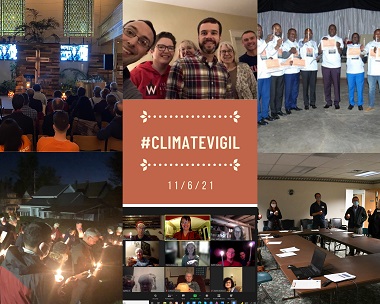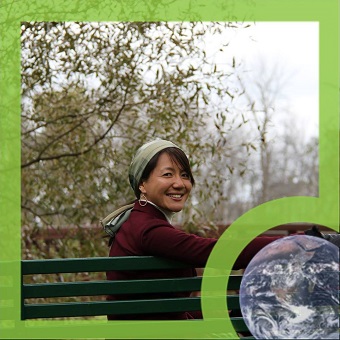
A collage from other climate vigils that took place around the world November 6.
As world leaders were huddled in Glasgow for the COP26 UN Climate Change Conference, leaders of Earthkeepers: Christians for Climate Justice and Open Way Church held an online vigil to light candles and to pray for climate action.
We had Christians join us online from Vancouver Island, to Metro Vancouver, to the Greater Toronto Area. Our small act of prayerful resistance against the deepening darkness of climate chaos was one pinprick of light that spanned the globe November 6.
It was part of the global #ClimateVigil campaign, an effort sponsored by the Evangelical Environmental Network to call global Christians to pray and act on climate change.
Lighting a candle and saying a prayer is admittedly a small thing. Yet, as frail creatures in the face of the climate crisis, it can sometimes feel as though we can do little more. As wildfires, hurricanes, heat waves, droughts and floods rage all around us, it is easy to sink beneath our despair. To succumb to the belief that because we cannot fix all of it, we cannot fix any of it.
Vancouver is no stranger to these worsening impacts of our changing climate. Long dry spells and heat waves in the summer and heavy rainstorms are two climate impacts that Vancouver will face (Metro Vancouver Climate Projections).
As I write this article, Search and Rescue groups are rescuing over 200 people stranded on Highway 7 just east of Vancouver after the landslides caused by heavy rainstorm forced road closures.
Fossil fuels
The main culprit of this chaos is greenhouse gas emissions released through the harvesting and burning of fossil fuels. When this carbon dioxide, methane and nitrous oxide are released from oil, gas and coal infrastructure, they enter our air alongside countless other harmful chemicals and byproducts. This potent cocktail of benzene, volatile organic compounds and soot is air pollution that harms our bodies.
Consistently, the populations most at risk from exposure to fossil fuel-related air pollution are the most vulnerable: young kids, pregnant women, the unborn, the elderly, the disabled, and Black and Indigenous communities.
There is also strong evidence that air pollution can lead to more COVID-19 infections overall and that improving air quality can help protect all of us from more severe COVID-19 effects (Metro Vancouver Air Quality and COVID-19)
Each year, fossil fuel pollution is blamed for more than 15,300 premature deaths in Canada. It is linked to low-birth weight and premature births in pregnant women, and higher rates of asthma and other respiratory ailments in young kids.
A Save the Children report found that around the globe, children born over the past year will on average face seven times more scorching heatwaves than their grandparents under the original Paris Agreement emissions reduction pledges (Save the Children, 2021).
Resurrection, not resignation
Indeed, hopelessness in the face of these catastrophes is natural. Yet our Christian faith is one of resurrection, not resignation. It calls us to comfort the sick, release the captive, and preach the good news of God’s nearness to all creation.
That requires us to resist the death-dealing powers that are polluting our communities, sickening and killing our neighbors, tarnishing the beautiful places we call home, and risking the health of the people we love.
Jesus came to give abundant life. Our fossil fuel economy does the opposite.
Think local
There is, of course, no cure-all to the myriad threats posed to BC by pollution and a changing climate. Yet there are solutions to many of the worst of them at the ready. For the sake of our children’s health and the health of our other vulnerable neighbours, we must stop exporting polluting oil and gas products while making bold investments to continue to electrify transportation options. We must also protect remaining old-growth forests in BC and oceans.
The good news is that we can be good stewards of what we do have in BC. We have hydroelectricity – a low-emissions source of renewable energy – and a growing clean technology industry. We can improve the quality of life of our most vulnerable neighbours and for our children by switching to cleaner transportation.
Metro Vancouver’s own modelling under the ‘Road to Zero’ initiative found that increasing electrical vehicle use helps meet Vancouver’s climate targets, reduces air pollution and noise pollution, and also results in cost savings from lower fuel consumption.
And nation-wide
At the country level, we must invest in a rapid transition to a 100 percent clean energy economy, something the market has already initiated but that needs to be accelerated. We must ensure displaced workers and historically marginalized communities, including Indigenous communities receive substantive shares of that public investment, leaving nobody behind.
We must get to work and scrub dangerous methane emissions from every sector of our economy by plugging the 10,000+ orphaned and abandoned wellheads here in BC.
Act, lament, pray
And as we do, we must also attend to the small, simple acts that sustain our hope and our action. We must light candles. We must offer up our prayers. We must gather together to lift up the victims of the climate crisis, to confess and lament our complicity in their suffering, and to resolve to turn our prayers into action. We must encourage our church communities to do the same.
We must continue to trust that in the mysterious economy of God, lighting a candle and praying does make a difference. That it might just make all the difference in the world.

Monica Tang
Monica Tang has been involved in creation and climate care movements for over 10 years. She is a board member for Citizens for Public Justice, a Christian faith-based non-governmental organization advancing policy solutions to eliminate poverty, support refugee and migrant rights, and to advance climate justice.
She is also the former chair of Earthkeepers: Christians for Climate Justice, and was a delegate at the UNFCCCC’s COP25 climate negotiations in 2019 with the Christian Climate Observers Program. You can read her previous blogs about the COP25 climate negotiations here.
